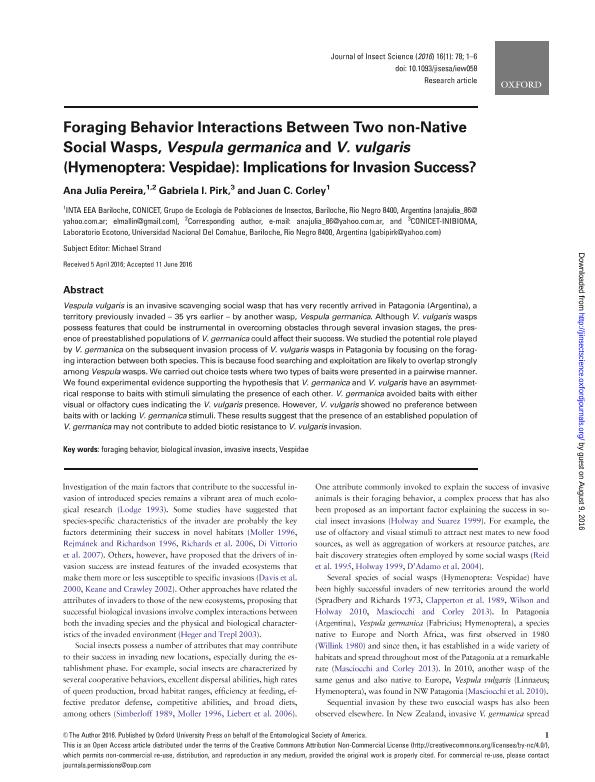Mostrar el registro sencillo del ítem
dc.contributor.author
Pereira, Ana Julia

dc.contributor.author
Pirk, Gabriela Inés

dc.contributor.author
Corley, Juan Carlos

dc.date.available
2018-06-01T18:30:57Z
dc.date.issued
2016-08-08
dc.identifier.citation
Pereira, Ana Julia; Pirk, Gabriela Inés; Corley, Juan Carlos; Foraging behavior interactions between two non-native social wasps, Vespula germanica and V. vulgaris: implications for invasion success?; University of Arizona; Journal of Insect Science; 16; 1; 8-8-2016; 78/1-6
dc.identifier.issn
1536-2442
dc.identifier.uri
http://hdl.handle.net/11336/47002
dc.description.abstract
Vespula vulgaris is an invasive scavenging social wasp that has very recently arrived in Patagonia (Argentina), a territory previously invaded -35 years earlier- by another wasp, V. germanica. Although V. vulgaris wasps possess features that could be instrumental in overcoming obstacles through several invasion stages, the presence of pre-established populations of V. germanica could affect their success. We studied the potential role played by V. germanica on the subsequent invasion process of V. vulgaris wasps in Patagonia by focusing on the foraging interaction between both species. This is because food searching and exploitation are likely to overlap strongly among Vespula wasps. We carried out choice tests where two types of baits were presented in a pairwise manner. We found experimental evidence supporting the hypothesis that V. germanica and V. vulgaris have asymmetrical response to baits with stimuli simulating the presences of each other. V. germanica avoided baits with either visual or actory cues indicating the V. vulgaris presence. However, V. vulgaris showed no preference between baits with or lacking V. germanica stimuli. These results suggest that the presence of an established population of V. germanica may not contribute to added biotic resistance to V. vulgaris invasion.
dc.format
application/pdf
dc.language.iso
eng
dc.publisher
University of Arizona

dc.rights
info:eu-repo/semantics/openAccess
dc.rights.uri
https://creativecommons.org/licenses/by-nc/2.5/ar/
dc.subject
Foraging Behaviour
dc.subject
Biological Invasion
dc.subject
Invasive Insects
dc.subject
Vespidae
dc.subject
Social Insects
dc.subject
Hymenoptera
dc.subject
Feeding Behavior
dc.subject.classification
Otras Ciencias Biológicas

dc.subject.classification
Ciencias Biológicas

dc.subject.classification
CIENCIAS NATURALES Y EXACTAS

dc.title
Foraging behavior interactions between two non-native social wasps, Vespula germanica and V. vulgaris: implications for invasion success?
dc.type
info:eu-repo/semantics/article
dc.type
info:ar-repo/semantics/artículo
dc.type
info:eu-repo/semantics/publishedVersion
dc.date.updated
2018-05-28T14:49:49Z
dc.journal.volume
16
dc.journal.number
1
dc.journal.pagination
78/1-6
dc.journal.pais
Estados Unidos

dc.journal.ciudad
Nueva York
dc.description.fil
Fil: Pereira, Ana Julia. Consejo Nacional de Investigaciones Científicas y Técnicas. Centro Científico Tecnológico Conicet - Patagonia Norte; Argentina. Instituto Nacional de Tecnología Agropecuaria. Centro Regional Patagonia Norte; Argentina
dc.description.fil
Fil: Pirk, Gabriela Inés. Consejo Nacional de Investigaciones Científicas y Técnicas. Centro Científico Tecnológico Conicet - Patagonia Norte. Instituto de Investigaciones en Biodiversidad y Medioambiente. Universidad Nacional del Comahue. Centro Regional Universidad Bariloche. Instituto de Investigaciones en Biodiversidad y Medioambiente; Argentina. Universidad Nacional del Comahue. Centro Regional Universitario Bariloche. Laboratorio de Ecotono; Argentina
dc.description.fil
Fil: Corley, Juan Carlos. Consejo Nacional de Investigaciones Científicas y Técnicas. Centro Científico Tecnológico Conicet - Patagonia Norte; Argentina. Instituto Nacional de Tecnología Agropecuaria. Centro Regional Patagonia Norte; Argentina
dc.journal.title
Journal of Insect Science

dc.relation.alternativeid
info:eu-repo/semantics/altIdentifier/url/https://academic.oup.com/jinsectscience/article/16/1/78/2726691
dc.relation.alternativeid
info:eu-repo/semantics/altIdentifier/doi/http://dx.doi.org/10.1093/jisesa/iew058
Archivos asociados
